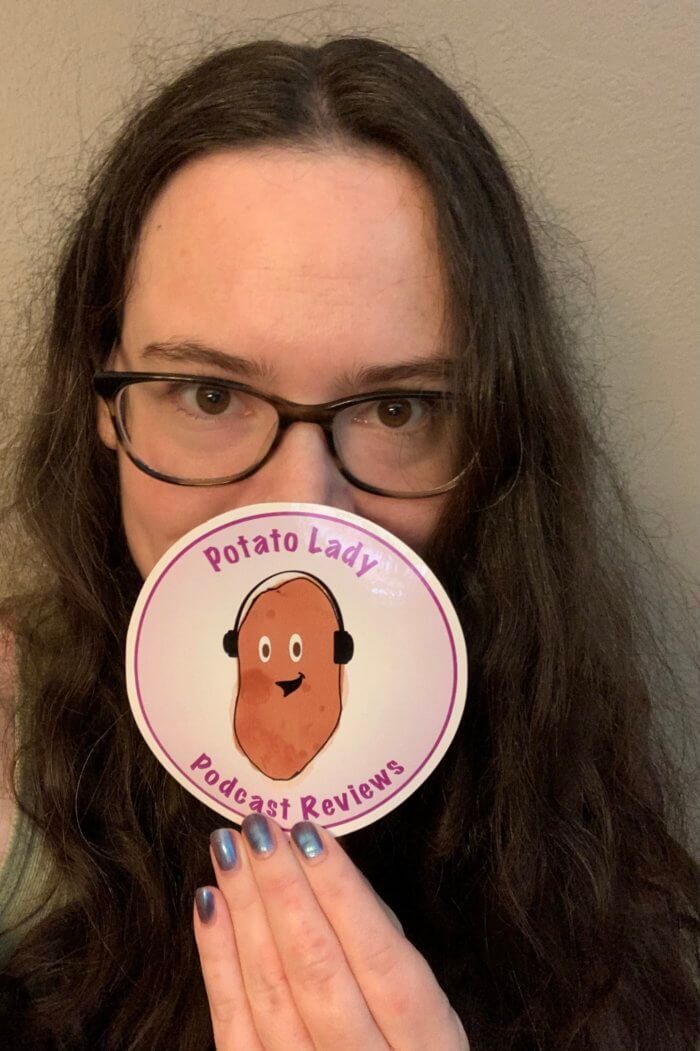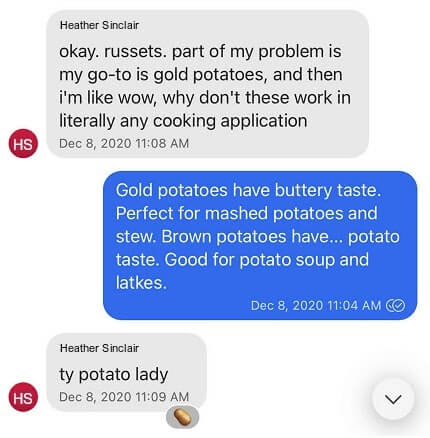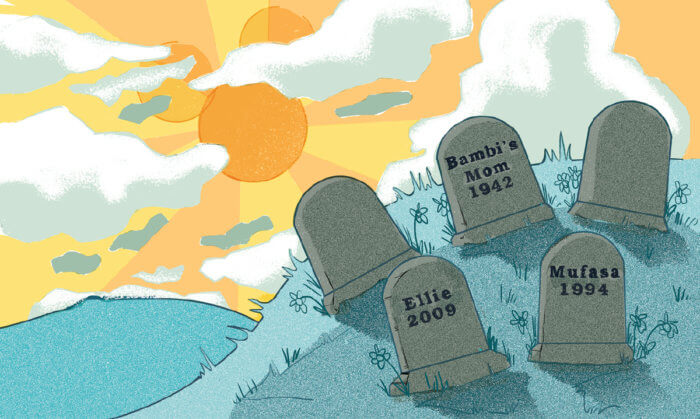Tastemaker Spotlight: Potato Lady Reviews
Rebecca Goos, or “Potato Lady Bex Goos” as she is known by her username, is both a major reviewer and podcast creator. She is an active user on Podchaser, Twitter and even runs her own website! Because Rebecca/Potato Lady takes the time to review so many new and exciting shows, she has established herself as a tastemaker. We virtually sat down with her to hear her thoughts on reviews, the podcasting industry, and even children’s stories! Check out the interview below!
Q&A with Rebecca
To give our readers some context, can you tell us a bit about yourself?

I was born in Los Angeles, California, to a fairly large and incredibly loving Jewish family. Though my best subject in school was always math, I decided to become an English teacher sometime during college.
My biggest dream in life was always (and still is) to become a published Young Adult author. Because of this, I majored in English with a concentration in creative writing, and this lent itself nicely to become an English teacher. Since I love writing and creativity, I feel blessed to be able to put that to use in the form of my podcast reviews.
How and what got you so invested and active in the podcast world?
I started listening to podcasts in the summer of 2017. My older son was a baby, just six months old or so, and that meant spending late nights sitting up with him. At the same time, my friends were gushing that the finale of something called “The Adventure Zone” was coming up. They said it was a podcast they both listened to. I had heard of podcasts, but did not fully understand what they were. Still, their enthusiasm was enough for me to seek out this one particular show.
I was hooked from the start and binged the whole thing in a very short time. From there, I moved on to My Brother, My Brother, and Me (the podcast that preceded The Adventure Zone), and The Flop House. I loved the varied content, and I had this nostalgic feeling of looking forward to a favorite TV show coming out on a particular day, back when that was a thing.
How did you become the “The Potato Lady?”
This is a two-part story. First, there’s me sitting at work during one of my open periods feeling frustrated and despondent about my inability to use social media effectively to get the word out about my podcast. In that moment, I realized there was no way I was alone in that. I was sure there were other indie podcasters feeling the same way, so I Tweeted out (paraphrased):
I know no one will see this, but I’ve just started a podcast, and I know how hard it can be to get the word out there. So here’s what I’ll do, If you comment on this post with a link to your podcast, I’ll subscribe, rate, and post a review on Twitter.
Three podcasts responded, which surprised me a little. I had used hashtags, but I had maybe a dozen followers, so I didn’t think I was particularly visible. I guess the hashtags helped. It didn’t take a lot of time to review those first three, but by the time I got through them, I had a few more requests. After I was done with those, I decided to try another Tweet. This was fun, and I liked the writing aspect of it. It was the first time I’d used my writing to make a difference in someone else’s life. More people responded to the second Tweet. And so on, and so on.

The second part is: Chanukah was upon us, and my best friend was asking about the best potatoes to use for latkes (for non-Jews who are unfamiliar: think of hashbrowns mixed with egg, flour, and onion and fried in olive oil until crispy). I extolled the virtues of russet potatoes for latkes (and also learned that very day that there’s a difference between Idaho potatoes and russet potatoes). I also explained that I loved golden potatoes for stews and loaded mashed potatoes. At the end of this brief conversation, my friend replied, “Thank you, potato lady.” (I saved a screenshot of that because that conversation became everything.) I was tickled by the moniker, so I changed my Twitter name to Potato Lady.
What is a “must-have” in all “good” reviews?
A good podcast review should be specific to the show itself. It shouldn’t be something generic that can be applied to any show because the point is to catch the eye of people who are browsing for new content. If they see some keywords in a review that fit their interests, they’re more likely to give the show a try. Be specific about what makes you like the show. What about it made you willing to take the time out of your day to write out a review? That’s what people and podcasters like to see.
*Check out this other guest article on what makes a good podcast comment!
What incentivizes you to review or rate a particular show?
Prior to becoming a podcast reviewer, if I loved a show, I would happily leave a rating. Sometimes I wouldn’t bother if that show already had 1,200 positive reviews. Other times, if the creator specifically said they appreciated reviews, I’d go ahead and do it.

Now, of course, I leave reviews kind of officially. I don’t turn people away from my list, though maybe that might change one day if I get absolutely inundated with requests. Regardless of what I post in my Twitter review, I leave a 5 star review on their podcast. My thinking is that I can highlight the positive, and if someone else doesn’t like that, then that’s their opinion. They’re entitled to feel the way they feel, of course.
What makes a 5 star show, vs a 4 star show vs 3 star and so on and so forth?
I’m going to be honest, I have seen people rate shows 3 and 2 stars, and I don’t really get it. For me, I either like a show so much that I’m hooked and I think it’s 5 stars, or I move on. No need to cast negative energy at someone just because their show doesn’t happen to be my particular cup of tea. I suppose I would rate a show 1 star if it were outwardly offensive, bigoted, or racist. Or if it spread misinformation. But then I’d probably do more than a rating; I’d try to report it.
Why is it important to have “tastemakers” and for listeners to leave ratings and reviews on podcasts?

I think it’s especially important to have people out there who will draw attention to content that doesn’t have a huge audience yet. There are plenty of podcasts out there that have hundreds of thousands of fans, and a lot of them got there due to word of mouth. Tastemakers can help that happen for smaller shows that don’t necessarily have a huge budget for production or advertising.
As for ratings and reviews, aside from the algorithm stuff that gets these shows seen, I think it is physical evidence for the podcasters that someone is listening. A 5 star review feels good, and it can take away the sting of a 1 or 2 star review. When someone creates a podcast, I like to think one of their top goals in putting themselves out there is to know that there’s someone on the other end listening. A good review and rating can reassure a podcaster. It says, “I’m here. I’m listening.”
What is/are the community of podcast listeners missing or needing right now?
This is a tough one to answer. I think, in large part, podcast listeners are already on the right track. They’re using social media and word of mouth to raise awareness for good shows.
The one thing I’d say is that listeners shouldn’t feel shy about interacting with the podcasters they listen to. As far as I can see, whenever a listener reaches out on Twitter or Instagram, it makes the show creators super happy. I know I’d be delighted to hear from someone who considers themself a fan. As long as interactions are civil and polite, I would advise listeners to get on social media and connect a little more. I know it would be welcome and appreciated.
You co-host the show “Not Again!” with your husband where you take a college-level analysis to preschool-level content or children stories. When did this idea really come to you both and take off?

The idea came to me when I was watching a Netflix show called Go! Go! Cory Carson for the umpteenth time (This wasn’t by choice; my son was there watching, too). I was getting so frustrated with all these little nitpicky details that I wouldn’t have cared about if I’d only seen the show once or twice. At first I thought I could blog about it, but I didn’t think anyone would really want to read walls of ranting text about children’s shows.
It occurred to me that podcasts are kind of like audio blogs, so I ran the idea by my husband, and he said, “I’m in.” Truth be told, I hadn’t considered having him on the show. I didn’t think he’d be interested. I wasn’t sure how our dynamic would work in a recording, but we did eventually hit our stride, and now I can’t imagine the show without him.
I’m an English teacher, so I’m given to over-analyzing everything already. It turned out better than I expected, especially now that we have some more equipment and knowhow. It’s fun and cathartic to share all those nitpicky little things in a podcast. Sure enough, I stopped yelling at the TV as much after we started the show. Especially when we did the Finding Nemo episodes. That was a load off my mind.
What is your favorite and least favorite children’s story you have had to view or analyze and why?
We haven’t done an episode on it yet, but the best children’s show to review and analyze is Ben & Holly’s Little Kingdom. Not everyone has heard of that one, but they have usually heard of Peppa Pig. I can’t stand Peppa, but the creators of Peppa made Ben & Holly, and I love that one. It’s so self-aware, and it honestly provides some excellent satire, to the point where I use an episode of that show in my AP English Literature class to introduce satire. (The episode is called “Hard Times.”) Ben & Holly’s Little Kingdom and the Netflix show, Puffin Rock, are probably the most entertaining shows I’ve seen for little kids.
My least favorite show to view is Super Wings. It’s still fun to over-analyze, but I would give up analyzing it in a second if I never had to see it again. That and the How to Train Your Dragon spin-off show Rescue Riders. I love HtTYD, so that was particularly egregious to me. It’s such an adulterated version of the original content. It’s insulting. As for Super Wings… well, I don’t want to repeat my podcast too much*, but that show fakes being educational. The premise is completely nonsensical, and every episode becomes annoying pretty quickly.
*You can find Rebecca’s Super Wings episode here
Hypothetically…you’re about to write a kid’s story, show, movie anything…what is the one thing you are going to be sure to do and NOT do?

I would definitely make sure to keep both parents alive. Killing a parent or making them sick as an impetus for the plot is so overdone that I consider it lazy storytelling at this point. (I’m a total hypocrite because I have relied on this trope in my own writing at least once, but I’m referring specifically to kids’ shows and movies.)
I think what drives me most insane is when the universe of these shows raises unanswerable questions that I don’t even want to think about. As an adult, how can I not wonder about the world of Cars? I hate that it makes me ask about how cars reproduce, for example. In Cory Carson, they do things that can only be accomplished with hands, yet they have tires. It’s okay, in theory, that it’s illogical because kids don’t care, but I can’t stand it. I don’t mind anthropomorphized animals too much when they make the world like Zootopia, but in Peppa Pig they have pets! They are animals who wear clothes and go to school, and they also keep animals as pets. That bothers me.
If you could tell all podcast listeners and Podchaser users one thing, what would it be?
Be forgiving. Concentrate on content more than anything. Is the content interesting to you? Do you feel the host’s enthusiasm? That’s what’s important. Yes, good audio quality and awesome theme music is a huge bonus, but not everyone has access to the resources to make that happen. Some people are recording with what they have available to them. So be forgiving of little hiccups, and know that a lot of shows get better over time as the hosts learn the ins and outs of podcasting.
If you don’t like a show, don’t go out of your way to rate it poorly. First ask yourself if it’s a show that could be for someone else, and remember that there’s a human being on the other end of that 1 star review. Like I said, if a show is outwardly offensive, dangerous, or racist, go ahead and take it down. Otherwise, maybe let it lie. Let other people draw their own conclusions.

And one more time: Say hi to your favorite podcasters! You might just make their day. Oh, and if you like a show, it’s really easy to leave a 5 star review. You aren’t required to write a review. That’s optional. Just tap or click the five stars. It only takes a second.
Follow Rebecca Goos/The Potato Lady
Follow Rebecca Goos on Podchaser, Twitter and check out her Website!
Unlock more with Podchaser Pro
- Audience Insights
- Contact Information
- Demographics
- Charts
- Sponsor History
- and More!

- Account
- Register
- Log In
- Find Friends
- Resources
- Help Center
- Blog
- API
Podchaser is the ultimate destination for podcast data, search, and discovery. Learn More
- © 2024 Podchaser, Inc.
- Privacy Policy
- Terms of Service
- Contact Us